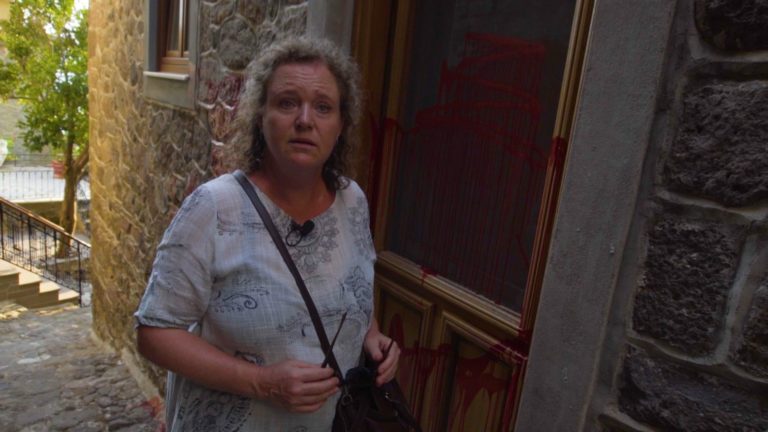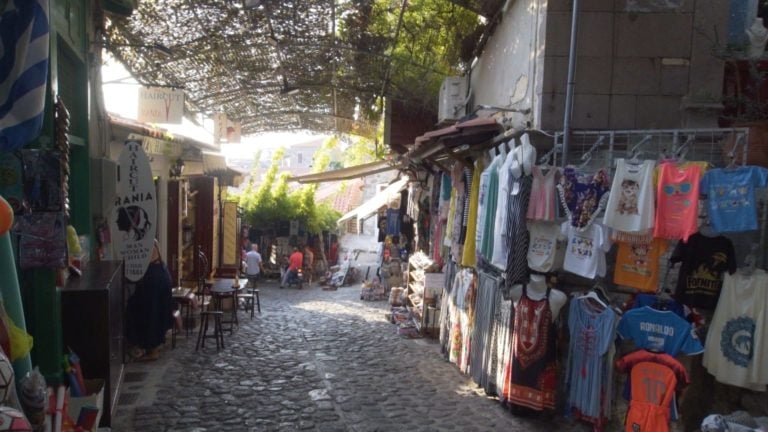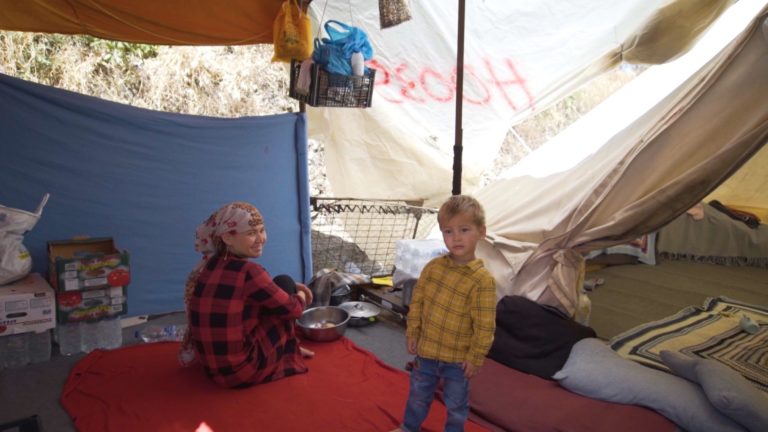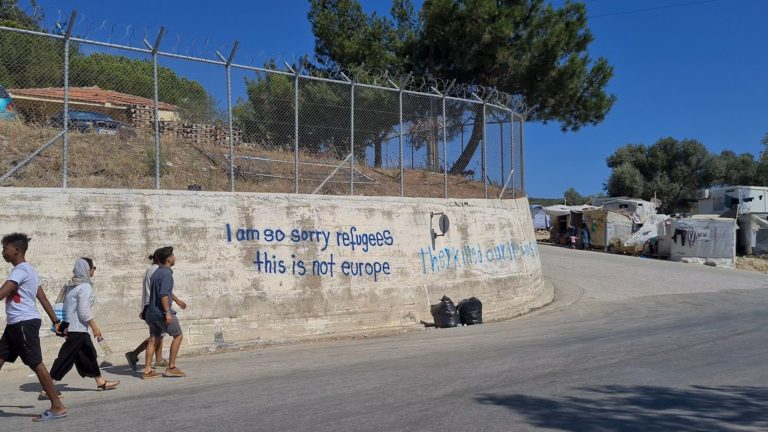On the northern shore of the Greek island of Lesbos, Greek Australian volunteer Melinda McRostie has been providing aid to refugees from her restaurant on Molyvos Harbour, right from the very beginning of the largest refugee crisis since World War II.
With a group of locals to help, Ms McRostie soon started her own NGO, the Starfish Foundation, which has supported more than 200,000 refugees with food, clothing, counselling and medical care.
The large influx of refugees led to the creation of a refugee camp close to the village of Moria that at this moment holds more than 13,000 refugees, making it the largest refugee camp in Europe.
Things have always been hard at the overcrowded facility, but now the situation has reached a completely new level. Since the start of the global pandemic, NGOs and volunteers have not been allowed to travel and assist. But last week, the overcrowded camp was shut down completely to outsiders after it recorded its first COVID-19 outbreak which has caused it to go into lockdown.
“We now have four known virus outbreaks in the camp”, Melinda McRostie told Neos Kosmos (though there were 17 cases recorded by Tuesday), and the people detained at the camp are now in quarantine. “The refugees are not allowed to leave, which is quite a problem as the camp does not have proper facilities for everyone and the food is not the best.”
READ MORE: 169 new COVID-19 cases in Greece, with 35 cases at Moria migrant camp

At the last count, there were about 13,000 people inside the camp which was created with a capacity to hold 3,000 people, she explains. Refugees are striking because of the bad quality of the food, and as they’re not allowed to leave the camp, they can’t drive into town for supplies of fresh fruit and vegetables.
Worst still, refugees are continuing to arrive by boat, though the numbers are much less as there have been many ‘push backs’. “Not many people have ‘landed’ but then they seem to have been pushed back to Turkey. This is highly illegal and the Greek government is saying this is not happening. We did have two boats arrive yesterday on the island. Whoever arrives is now immediately put into quarantine and gets tested for the virus, before they are taken to Moria.”
“The bureaucracy for those granted asylum is a vicious cycle nearly impossible to break”
Thousands of refugees are waiting for their asylum to be granted, and this can take quite a few years according to Ms McRostie. Those who are refused asylum have to go back. Many are sent back to Turkey or even Pakistan. But even when asylum is granted, it seems that they still have a long way to go before they can lead a normal life.
“Once they are granted asylum, they are asked to move out of the camp and fill out their paperwork so they are able to work. The bureaucracy required to get this paperwork so they can work is very, very difficult. They need to get a tax number and to get a tax number you need a house that you’ve rented, and to rent a house you need money, to have money you need a job and a tax number. So, it’s all a vicious cycle, unless somebody can help them get onto the right track to become integrated,” she said.
“Many people want to go to school but that is hard too, as schools will only take a certain number of children. Now there is a new law coming out requiring a certain knowledge of Greek to be able to attend school. There’s nowhere for them to learn Greek, so again, it’s another vicious cycle.”
READ MORE: Insider’s guide to the two sides of Samos: Greek tourist paradise vs refugee ‘jungle’

“Many locals have stopped helping because they are too scared that they will be victimised”
The locals have been through a lot. “Originally when all the refugees started coming through, many locals did help but because of the rise of the right wing, and the increasing number of people who are hostile to the refugees, many locals who originally helped have now stopped helping because they’re too scared that they will also be victimised,” she said.
There is also a lot of misunderstanding and misinformation, Ms McRostie explains. “There is a lot of gossip that isn’t true. People are believing everything they’re hearing. I guess this is happening all over the world. Somebody posts something on Facebook and believes it without questioning things first. The ones hostile to the refugees are becoming even worse now because everybody’s feeling more and more sorry for themselves.”
“There is also an argument that the refugees wouldn’t have come here if we weren’t helping”
“First, we had the economic crisis, then we had the refugees that came through which affected our tourism. In 2015 after we had the million refugees come through this island, the following year we saw an 80 per cent drop in tourism. Some people argue that the refugees wouldn’t have come here if we weren’t helping, so they target the people who are helping refugees. The same people who are hostile don’t believe we have volunteers who travel here at their own expense, and pay for themselves. This helps the economy as they rent houses, cars and put money back into the island,” she said.
“These people think they must be making money for their work and they wouldn’t do it for free. I think it’s very difficult now as there are so many people who are so angry, and it’s very hard to get through to them.”
With the pandemic, the situation has been worse than ever on the island. The village of Moria, which is right next to the camp has suffered the most as many refugees coming through are very hungry and some will steal, according to Ms McRostie.
READ MORE: Greece’s refugee crisis, a ‘hard’ but not ‘impossible’ equation

“Unfortunately, instead of all this making us come together, it’s tearing us apart”
Ms McRostie has also been victimised and bullied because of the help she offers to refugees.
“I have a restaurant, we work with tourism, this is our whole life too,” she said.
“We are also suffering. This year we’ve opened our restaurant and I’m sitting here just trying to make enough money for the rent. Out properties which we rent out to people are empty. We’re all suffering from this together.
“Polarisation is not helping us join together to fight this as one. It’s very sad, I feel like my children have suffered quite a lot from this but it’s also made them grow stronger. It’s made them become better human beings. They’ve suffered from me being victimised because I help refugees. They’ve heard stories of me, they’ve felt really bad about certain things. Basically they want to leave the island and never come back. Yes. I’ve been victimised. Yes, I’ve been bullied on Facebook, I’ve had red paint thrown on our houses, a letter thrown under the door with a matchstick and I have lost many friends.
“What’s really hurt me more than anything else is that they’ve pulled my family apart. I have to be here. I have a restaurant and rental properties and we can’t just get up and leave. Now my children don’t want to visit the island. They will only see me if I go to them. That hurts. That’s more painful than anything.”
What is the Greek government or the EU doing to facilitate the situation in Lesbos, we ask her.
“The government has received money from the EU to cope with this situation.” Ms McRostie said.
“But they were never prepared and haven’t had lessons on how this is meant to go. Originally they tried to do their best, but now with the new government in Greece, things have become much harder for the refugees. They’re not so friendly to the refugees.
“Of course it’s not fair that Greece is taking the brunt of this refugee situation, and the EU is not doing much to help take people in since they closed their borders so quickly in 2015.
“Other people from the EU or around the world need to help with this situation, as many thousands of refugees are stuck in Greece. Locking them up in a camp isn’t the right course of action. It just makes them depressed, they’re not looked after properly, the food they serve only has 800 calories per person, people get sick. It also doesn’t help them integrate into society, or learn the language so they can improve themselves and acquire skills. Many refugees do have skills that we could benefit from, and learn from.”

“This problem isn’t going away. This will continue for many years and it’s going to get worse”
“It’s amazing to me how many people who don’t meet the refugees pretend that this is not happening”, Ms McRostie stated.
“We created Starfish because we wanted to continue helping and we needed to be able to accept money. This problem isn’t going away. This will continue for many years and it’s going to get worse. A solution needs to be found for these people. I’m not just talking about the Syrian people. Yemen has a population of 28 million and if I’m not mistaken they’re all starving. There are many people suffering. The best thing would be for us to help the countries with basic issues like water shortages, and food supplies. There’re about 4.5 million refugees in Turkey. And Syria… How does one stop a war? If you speak to the Syrian people they just want to go home but they can’t.”
READ MORE: Greek grandmother receives Nobel Peace Prize nomination
“Can you imagine losing your home to a bomb, or packing up your whole life into one backpack because it might take you three to six months to get somewhere?”
“In 2014 my restaurant burnt down and I lost absolutely everything,” Ms McRostie said.
“All I could think was ‘Thank God it wasn’t my house, with all my private things’. These people have had to give up everything. It must be horrific. There are many stories of these people fleeing – sad stories, tragic stories, people losing their family, or not knowing if they will ever see their family again. There are too many stories. Too many tragic things happening.
A day in the camp is spent queuing up all day in long lines for food and appointments
“Many wake up at 4am in the morning to start queuing for breakfast,” Ms McRostie told Neos Kosmos, describing a typical day in the refugee camp of Moria. “Then they take the food home to eat, then they start queuing for lunch.
And then for dinner again. In between they have appointments for asylum, appointments to see a doctor, so it’s just one whole day spent queuing. There aren’t many activities happening in the camp right now. There were some before lockdown. Since March most NGOs who operate inside have been asked the stop doing the activities. We were teaching women self-defense, doing yoga for women to empower them, as well as Greek language lessons. We’ve had to stop all of that since March.”
“The world has to care and understand it could be them tomorrow”
There are ways people from around the world can help the volatile refugee situation in Lesbos. Donating to the foundation that was created for their support “Starfish” (www.asterias-starfish.org) is one way, or when the time is right again for movement, volunteering.
“Imagine if a war suddenly broke out in Australia, wouldn’t you want people to care about you and help you?” Ms McRostie asked. “We need to care and we need to be there for other people. It’s a very difficult time for everyone. Donating money is always wonderful because we can’t continue doing what we’re doing without donations. I do think it’s very important to check the organisations you donate to are real and they really do what they say they’re doing.”
Ms McRostie has three children and they’ve all volunteered over the years.
“They’ve grown into better people, because they’re met refugees. I think volunteering is very important. It helps you grow and learn. My children have learnt by volunteering how important everybody’s life is and how these people are just like you and me. They’re just like us, just people, human beings.”
“My children have learnt by volunteering how important everybody’s life is and how these people are just like you and me”
Ms McRostie recalls a story with her 19-year-old son when a boat arrived with a woman and her children and a little baby in her arms. “They were freezing cold and the mother was semi-conscious. We’ve been trained that you have to take the baby out first and look after it, because the baby will be the first to die from the cold. So we took the baby out of her mother’s arms. We changed her as fast as possible. She was screaming and I gave her to my 19-year-old son to hold while I continued with the others. He didn’t know what to do. ‘What am I going to do with this baby?’ he asked me as the baby was screaming.
I just told him to keep walking up and down and rocking her until we could revive her mother. An hour later after her mother started to recover, the baby was fast asleep in my son’s arms.”
It was just the sweetest thing how he seemed to bond with the child and didn’t want to let her go, she says.
“Originally when I first started working under ‘Starfish’ we were very quiet, we never shouted or screamed, we just did what we did.
We do that most of the time. We’re not political, not left or right. We’re just caring for people. Solutions have to be found, there’s got to be some way that every human being in the world can be looked after. Not all the people who’ve come through here have been okay, we’ve had some “bad eggs”. But how can we stop helping just because of some exceptions? We need to keep helping people. One day you never know, it might be us needing help.”
Ms McRostie’s life took her from Australia to the island of Lesbos many years ago, when she was only a child. Both her parents are Australians, from Melbourne.
“I came with my mother to Europe when I was very young, and in Lesbos, she met my stepfather who was a Greek fisherman. She fell in love. It was a real life Shirley Valentine story (before the film). I was brought up in Greece, I have been living here permanently since I was 7. We’ve had a restaurant here for 25 years called ‘The Captains Table’ and everyone thinks I’m here in this quaint beautiful village called Molyvos because I married a Greek person. But I’m here because of my mother. My husband who is Greek, is here because of me.”







